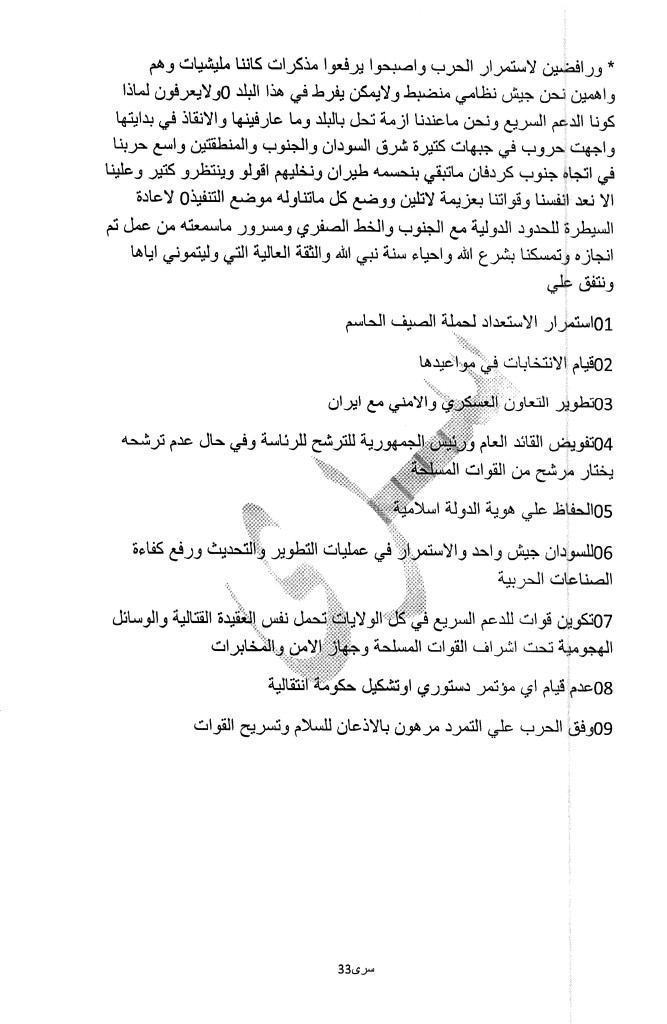Examples of Sudanese native speakers of Arabic on the authenticity of the minutes of 1 July 2014 meeting in Khartoum comprising senior military and security officials, including President al-Bashir
Eric Reeves, 18 February 2015
A compendium of responses to the question of authenticity of the document containing the minutes of the 1 July 2014 meeting in Khartoum comprising senior military and security officials, including President al-Bashir; more will be posted as they are received:
Final page of Arabic text (page 33)
N.A.—Sudanese academic
“From the language, I can tell they are Sudanese government official documents. From the content, it’s apparent they are Sudanese military leaders documents. They clearly discuss the destructive military policy of the Sudanese government. In addition, the documents are described as ‘confidential.’
“Normally, official government documents, letters, and reports are numbered. I don’t see this document is numbered. Maybe military documents and communications are an exception to that.”
[Actually, the pages of the Arabic text are numbered, center bottom—ER]
O.I.—Sudanese human rights investigator in the diaspora:
“I looked carefully at these pages. They are quite consistent with the way the army does its briefings. The heading, the way they listed the seniors, and I looked at the way Bashir was paraphrased in the briefing which is again consistent with this type of activity where the Commander-In-Chief gives brief remarks pain the way for his hands-on officers to elaborate on the operations.
“I have seen similar documents through the years and I can say with a great degree of confidence that this is authentic. Otherwise, those who put it together must be in high places and are privy to this kind of information.”
A.H.—Sudanese academic in the diaspora
“I can tell you that these are their language, jargons and names. The agenda also makes sense:
[1] the security and military situation in the military operations field;
[2] the situation in the neighboring countries and its effect on Sudan;
[3] the current Summer Military offensive;
[4] the political situation in Sudan;
I checked the detailed minutes I found them consistent with their policies and positions, for instance:
[1] they vowed to continue the ongoing military operations regardless of the international criticism , which I cannot see it now, as there is an international silence about the ongoing scored earth campaign in Darfur and Nuba Mountains
[2] they mentioned the issue of Mariam, the Christian lady and they said it was not their fault, because the girl was brought to the court by her own relatives. This is also consistent with their rhetoric.
[3] the link between the communist party and civil society organizations. Yes, they always say that!”
M.G.—Sudanese academic researcher, not in Sudan: [Responding to the question: Is this text genuine?] “Yes, definitely more than the [August 31, 2014] document. The attendants are truly the army command, there are no NCP politicians attendant, and the proceedings are in line with actual policy. The question to me, although conspiratorial, is why they are leaking this material?”
[As the recipient of these minutes, on two occasions, I can offer publicly no further information about their “chain of custody,” or even my immediate Sudanese source. I think it possible to say that this is not the doing of someone currently senior in the SAF or Intelligence Services; but the regime in Khartoum has experienced a divisive few years, and these leaks are almost certainly a product of this division—ER]
O.G.—Sudanese academic, UAE:
“Yes these are authentic secret meeting minutes. I can’t wait to see the whole picture as it will be very useful….”
[The entire text of the original minutes (Arabic) is now available at:
S.D.—Sudanese academic and linguist in exile:
I went through the script. Every thing seems perfect except for one word in the speech of Mr. Hussein (document 4 according to what you have sent) which strikes me as not Sudanese. The speaker was roughly saying “… the heroic role the soldiers in SAF and Security are assuming in defending the gains of the Revolution, Algammhoria, (the republic!) and unity. I don’t remember hearing a Sudanese using this word for the (country)… it is more of an Egyptian term. People here usually say Albaladd or Albilaad or simply Alsudan.
As this latter examination of the text reveals, there have been queries and doubts on very particular matters, including a couple of dates; in some cases the explanation may lie in an inaccurate rendering of the Arabic spoken in the meeting in the Arabic actually written down. This, however, can only be speculation. Again, as more assessments or corrections to my commentary on the English translation arrive, I will post them. Some have already been incorporated into the English text.
Collectively the assessments argue very strongly for authenticity.
